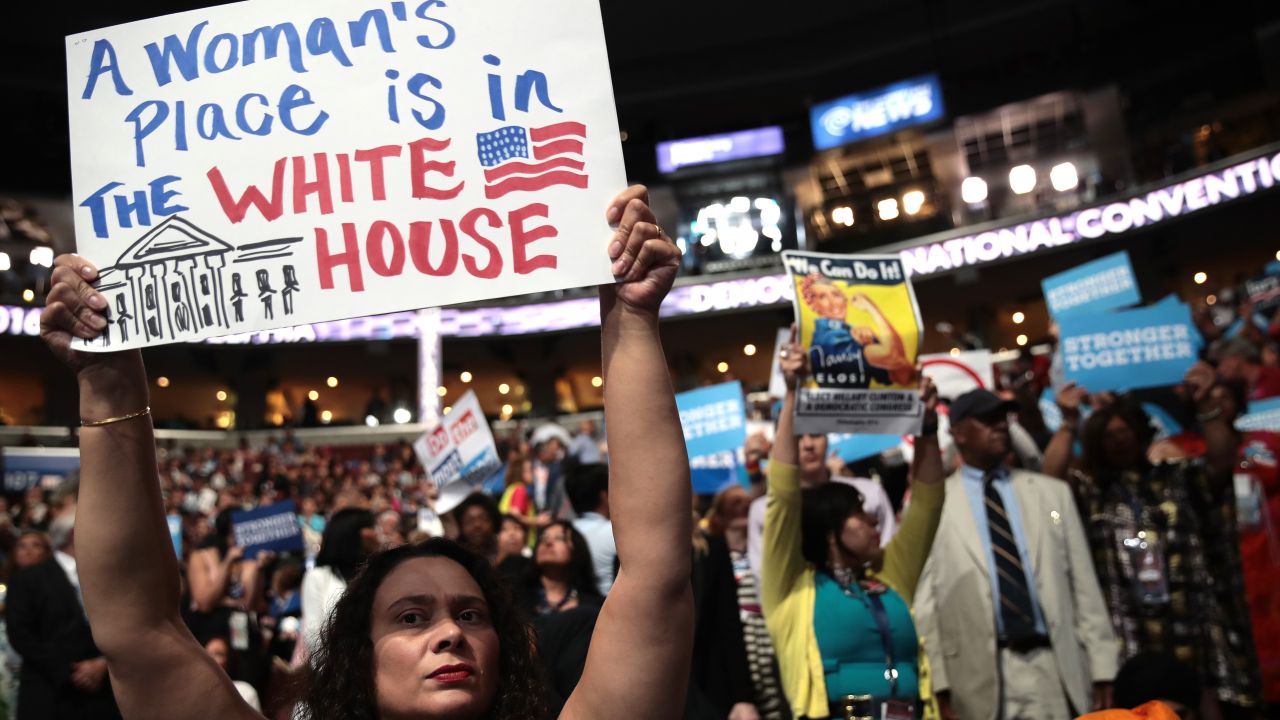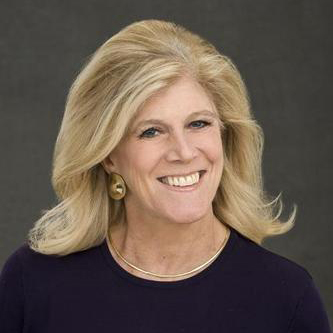
A delegate holds up a sign on the third day of the Democratic National Convention at the Wells Fargo Center, July 27, 2016 in Philadelphia, Pennsylvania. (Photo by Drew Angerer/Getty Images)
We’ve been waiting for this a long time. Correction: working for it.
Back in 1970, during spring training of the Charlie Brown All-Stars baseball team, Lucy of the Peanuts comic strip calmly let an easy pop-fly drop to the ground, right at her feet. When Charlie demanded an explanation from his belligerent outfielder, Lucy replied with a satisfied grin, “I’m a new feminist.”
Her insolence captured the zeitgeist. Half a century after American women finally won the vote — nearly two centuries after Abigail Adams warned her husband, John, that women, left out of the political mainstream and the impending Constitution, would “foment a rebellion” — new generations of uppity women stood up, or stood firm, to claim the rest of their rights. Over the next decade, nothing was safe from assault, from the outmoded advice in traditional women’s magazines to the exclusionary policies of the Ivy League’s historically male colleges; from the cattle-call indignity of beauty pageants to the sheer injustice of unequal pay. If, in retrospect, there was too much emphasis on institutional symbols and not enough on racism and poverty, it was at least a beginning. And there was a giddy delight in newfound identity. When Ellie, the pint-sized feminist in Garry Trudeau’s Doonesbury’s comic strip learned that her mom had just given birth, she turned to daycare director Joanie Caucus and exulted, “It’s a woman! It’s a baby woman!” A generation’s baby announcements suddenly got reworded.
As a reporter both chronicling the revolution and awakening to its consequence, I felt the passion and the urgency of the moment as women, for the first time, joined the Supreme Court, the astronaut corps, branches of the military services, the religious pulpits, the network news anchor chairs. My own little chink in the overhead glass came in September 1976, when, as host of PBS’ USA: People and Politics (after founding anchor Bill Moyers moved to CBS), I became the first woman to anchor a regularly scheduled, prime-time TV network news series. Qualifiers and all, it was a start.
In fact, it was a social and political revolution. As Hillary Rodham had pledged in the first-ever Wellesley commencement speech delivered by a student — a year before Lucy liberated the outfield — America was “making what appears to be impossible possible.”
Still, one goal remained elusive.
“A woman should not be president,” insisted singer and citrus fruit spokeswoman Anita Bryant in 1972. “It’s not the way God intended it to be.”
Well then.
A few years earlier, a Democratic Party activist named Edgar Berman, who happened to be a physician, nailed the subtext when he said women should not aspire to the presidency because of “raging hormonal imbalances” once a month. He called it our “lunar problem.”
I am happy to report that Dr. Berman was quickly removed from his political position. But the loony notions about women’s executive ability have popped up more than periodically.
Women, according to most men and not a few other women, were too emotional, too fragile, too — well, female — to lead; their voices were both too shrill and too weak (sound familiar?) to be taken seriously; their brains incapable of the fine decisions made by the fellows who held power. And since power was the currency, government was the toughest nut of all.
Early women who tried to crack the code were deemed ugly and “unsexed.” They were vilified for wanting to “hustle with the rowdies at the polls… to subject themselves to coarse jests and indecent language.” Suffrage leader Susan B. Anthony took a dim view of the hypocrisy. Men, she said, had “made politics so filthy, according to their statement, not ours, that they are not willing for any decent woman to enter. Is this a confession of success or of failure?”
During one 19th-century debate in the US Congress about extending suffrage to women, a senator from Georgia pointed out that if women voted, they would have to be involved in government — and that would involve attending caucuses which MIGHT meet at nighttime. And that, he said, “is a laborious task, for which the male sex is infinitely better fitted than the female sex.
I am not making this up.
In the modern era, with women miraculously surviving the rigors of voting and starting to seek office themselves, Sen. John F. Kennedy predicted that a women might indeed lead the country some day, under completely unattainable circumstances. She would, he wrote, “require the charm and wisdom of an Eleanor Roosevelt, the leadership and military prowess of a Joan of Arc, the stately compassion of a Queen Victoria, the political sagacity of a Clare Boothe Luce, the courageous determination of a Sister Kenny, the pluck… of a Helen Keller.” Cue the heavenly choirs. President Gerald Ford brought it back down to earth in 1977. “I think it will happen this way,” he said. A woman, probably a Republican, “will be elected vice president and she will succeed a president who will pass away in office.”
No clue how the poor fellow would die.
In time, women of various parties and human imperfections ignored the guidelines and, having slipped through the doors and claimed a room of their own, started eyeing the rest of the building. Nearly 100 women, starting in 1872, have declared their candidacy for the White House. New York congresswoman Shirley Chisholm, in 1972, acknowledged that the goal was unrealistic, but hoped her candidacy would make it easier for someone else. Colorado congresswoman Pat Schroeder, thinking about entering the 1988 presidential race, expressed the frustration of all when, asked repeatedly if she’d run as a woman, responded, “Do I have a choice?” And every one of them endured the same sexist drivel, a tedious thread from the supposed horrors of “petticoat rule” (never mind the indignities when they dared to don pantaloons, known as bloomers) through the sneering “Iron My Shirt!” disrupters at Hillary Clinton’s rallies. The fixation on female apparel reached new lows in the mid-1970s when so many of us were forbidden to wear trousers to work. I always figured that it had something to do with legs — or, perhaps, wearing the pants.
Annual polling indicated that the American public was warming to the idea of a female president, from a low 33 percent approval in 1937, when Gallup first asked the question, to Roper’s more open-minded 95 percent in this decade. But still, some insisted, the country just wasn’t ready for a woman to be president. As if it were something for which one could, or should prepare. Madam President For Dummies?
As a result, our first female commanders-in-chief served only in fiction: The pre-feminist pablum of the 1964 movie, Kisses for My President, in which the Polly Bergen character resigns her presidency when she gets pregnant, leaving the smug first hubby (Fred MacMurray) to provide the happy ending: “It took 40 million women to get you in the White House, and one man to get you out.”
The 1996 sci-fi sendup, Mars Attacks!, where Natalie Portman’s character performs the duties of president only after the rest of the government is wiped out by little green aliens. The sabre-toothed TV satire VEEP, which pivots from feminism to cynicism, features the departing president (Julia Louis-Dreyfus) saying she hopes her legacy will mean more than just “the first president to pee sitting down since FDR.”
Me? I preferred Cherry Jones, whose presidential turn in otherwise scare-mongering 24 may have done more to pave the way than a dozen real-life candidates. If Jack Bauer can say “Madam President,” can’t everyone?
Finally, maybe, yes.
Because suddenly, we don’t need to imagine it anymore. Because finally, the question of readiness and the need for perfection, the annoying headlines about “bonnets” being tossed in the ring (there’s that clothing thing again) and the obligatory proof that a chief executive can bake as well as she can lead, have been erased by a candidate whose unprecedented resumé and uncommon perseverance coincide with unparalleled social change. In a fast-forward world where tweets have replaced sound bites, which originally replaced full thoughts and actual paragraphs; where the half-life of political statements is shorter than the lifespan of a mayfly; where telling the truth has become a partisan offence; the nomination of the first woman as president on a major party ticket is worth stopping for and breathing in and yes, celebrating. This is a moment that matters — history, more than 240 years in the making.
No, Hillary Clinton is not perfect. And no, you don’t have to vote for her just because she is female. As columnist Ellen Goodman wrote of the Sarah Palin candidacy in 2008, “Mom to mayor to governor to veep nominee? There’s one woman who didn’t have trouble raising her hand in class. There’s one woman who didn’t think she had to be twice as good as a man to run. Be careful what you wish for.”
Identity politics may seem exclusionary to some, but women only became a political group when they were excluded from the action. Turning that into full acceptance is more than satisfying. And despite the weariness of the decades-long battle — Haven’t we done that already? — and the occasional millennial yawn — Who cares whether a woman is president? We have all our other rights — this is not just “a” woman. Feminism is not Hillary Clinton’s platform; it’s in her DNA. When she famously equated women’s rights with human rights, she elevated the once-ridiculed demands of a vocal minority to the global agenda. As poet and author Robin Morgan has written, “I’m voting for Hillary not because she’s a woman — but because I am.”
In 2006, while deciding whether to seek the presidency, Barack Obama considered the impact on the next generations. “When I take that oath of office,” he said, “there will be kids all over this country who don’t really think that all paths are open to them, who will believe they can be anything they want to be…. And I think the world will look at America a little differently.”
I am reminded of the story that astronaut Cady Coleman told me about seeing Sally Ride, America’s first woman in space, giving a speech at MIT. “I’d seen a lot of astronauts on TV, and none of them looked like me,” she said. “Then I met Sally Ride and I think, maybe that could be me.” Some years later, after two flights on the space shuttle, Coleman took her young son to a reception at the Johnson Space Center in Houston. As they walked by the life-sized, cardboard cutout of another space-suited astronaut, helmet on and visor down, Coleman’s son asked, “Mommy, is that you?” When Coleman told him no, he said, “Well, if it’s not you, then whose mommy is it?”
She was, of course, wearing pants. Just saying.
On Tuesday night in Philadelphia, the enormity of this moment — not just a mom, but a grandma; the first woman to win a presidential primary; the first first lady to run for office in her own right — was not lost on the current first lady. “Because of Hillary Clinton,” said a clearly moved Michelle Obama, “my daughters and all of our sons and daughters now take for granted that a woman can be president of the United States.”
It’s about time.




